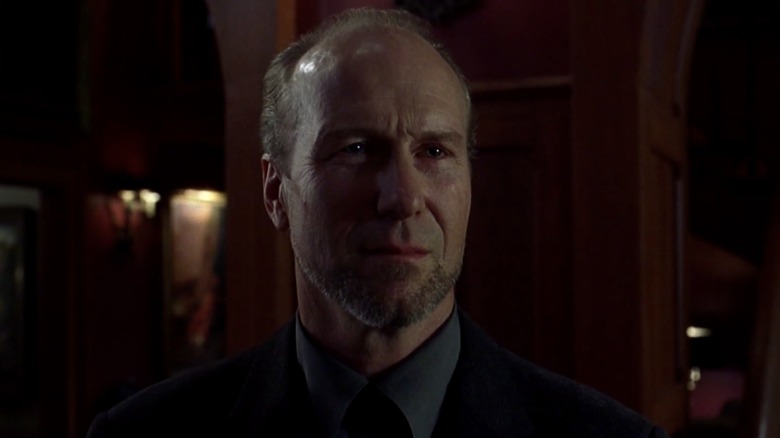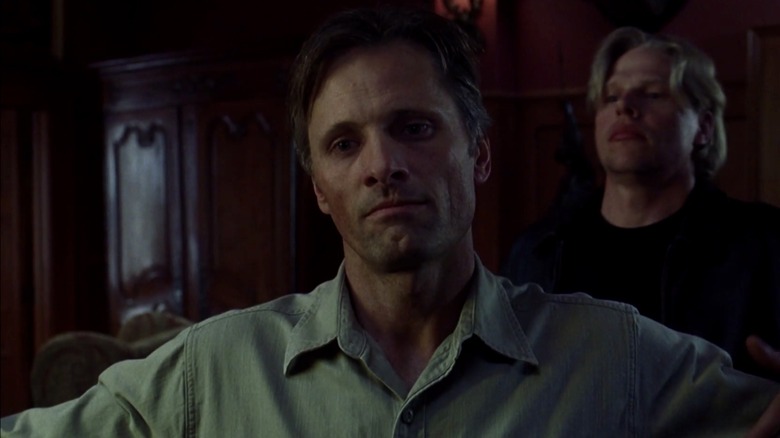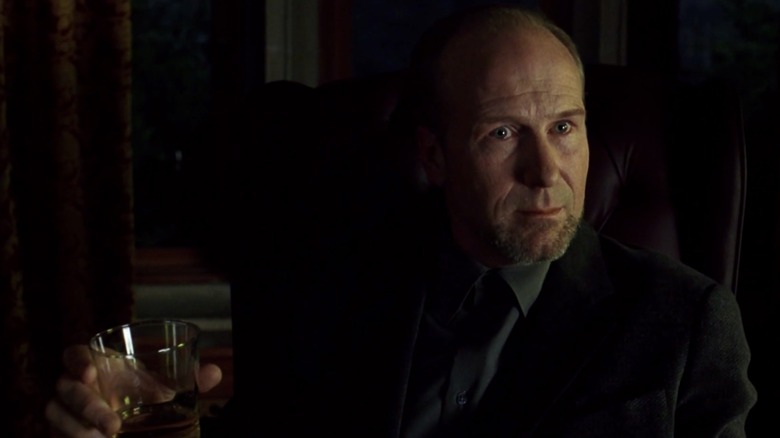William Hurt Gave One Of His Briefest Yet Best Performances In A History Of Violence
The death of William Hurt over the weekend brought renewed interest to his work, as is always the case, sadly, when an actor or artist of any kind passes away. In recent years, Hurt became known to a new generation of movie fans for his role as Thaddeus "Thunderbolt" Ross in the Marvel Cinematic Universe. He was there on the ground floor of the MCU in 2008 when he first played Ross in "The Incredible Hulk."
Hurt was actually one of the only actors from that movie to return in subsequent MCU films. He was most recently seen in "Black Widow" in 2021, which led to some speculation that Marvel Studios might be setting up a future for Ross as his super-powered, gamma-irradiated comics alter ego, Red Hulk.
As it is, Hurt still had a good long run as that one character, though his acting career dates back to the 1980s, and he was chewing the scenery as a comic book movie villain even before his Marvel days. In fact, his steely performance as one in the 2005 David Cronenberg thriller, "A History of Violence," earned him his fourth and final Academy Award nomination.
Cronenberg has been critical of comic book movies in the past, calling them "mostly boring" and "adolescent," but "A History of Violence" itself was adapted from a graphic novel by John Wagner and Vince Locke. In "A History of Violence," Hurt has less than ten minutes of screen time as Richie Cusack, but he comes in at the end to steal the show. And yet, while the Hurt hagiographies are being written right now, the elephant in the room is that he may have had his own troubling history. Maybe some of that feeds into his role as Richie.
Richie's entrance is built up
"A History of Violence" stars Viggo Mortensen, and the film's title refers to both the secret history of Mortensen's small-town diner owner, Tom Stall, and America's own dark history — the one that lies below the nation's "manifest destiny" of self-mythologizing. It turns out Tom is really a former mob hitman living under an assumed identity. Tom's real name is Joey Cusack; he's Richie's younger brother, and he used to be the kind of guy who would take out eyes with barbed wire before he started living the American dream.
Cronenberg saves the reveal of Richie for the third act, after Joey has dispatched a series of other goons. Joey's past first catches up with him after he makes headlines by foiling a robbery in his diner. Then, he has to deal with Carl Fogerty (Ed Harris), a gangster with scars and an old vendetta against him. In the aftermath, Joey receives a late-night call from Richie, but it's only shown from Joey's side. We just hear Hurt's voice, which is smooth and easygoing, yet threatening, as he asks, "Are you gonna come see me? Or do I have to come see you?"
Back in Philadelphia, at Richie's mansion, Joey is finally reunited with his brother in person. Cronenberg lets the scene unfold without any music, which only adds to the quiet suspense. Richie's henchmen frisk Joey before he can meet Richie, and again, we hear Richie's voice, which carries a soft wise-guy accent, behind Joey before we see his face. Then, Hurt comes walking down the stairs and enters the scene.
Hurt exudes menace in A History of Violence
Richie and Joey make small talk, but there's a thick undercurrent of tension running through it. Richie finally brings that to the surface when he says, "I'm pretty pissed at you, bro-heem."
In the Cusack family, business comes first. While Joey was off in small-town America, trying to avoid his past (which includes killing a made man), he wound up causing Richie trouble, interfering with his advancement in the mob back in Philly. They're brothers, but when he was little, Richie tried to strangle Joey in his crib. He admits, "You always were a problem for me, Joey."
It's what Richie represents that makes him so scary. In a broad sense, he's the face of one's dark side, the past that we push down, the inner nature that's all too base and human and therefore inescapable sometimes. So much of the American dream is predicated on the idea of the new life, making a fresh start. Yet as the events of the past few years have shown, America, like Joey, is still reckoning with its sins and perhaps never fully dealt with some of them.
Richie gives a personal face to the old wrongs that have come back to haunt Joey. He's his own brother and he wants to kill him.
Sitting across from Joey at his desk, Richie turns his back on his brother — literally — by swiveling his chair away from him as his henchman creeps up behind Joey to garrote him, "Godfather"-style. If you've seen the movie, then you know how that turns out. Suffice it to say, Richie is not one to brook failure and his own foul nature soon grows more unrestrained.
Hurt's appearance in "A History of Violence" is brief, but it shows what a good actor can do with limited screen time. As cinephiles look back on his work, "A History of Violence" is one movie that should definitely receive consideration.


